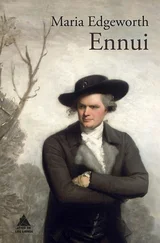One morning as she was sitting up in bed, looking over a large collection of notes, and cards of inquiry after her health, she exclaimed —
“These people will soon be tired of [4]bidding their footman put it into their heads to inquire whether I am alive or dead — I must appear amongst them again, if it be only for a few minutes, or they will forget me. When I am fatigued, I will retire, and you, my dear Belinda, shall represent me; so tell them to open my doors, and unmuffle the knocker: let me hear the sound of music and dancing, and let the house be filled again, for Heaven’s sake. Dr. Zimmermann should never have been my physician, for he would have prescribed solitude. Now solitude and silence are worse for me than poppy and mandragora. It is impossible to tell how much silence tires the ears of those who have not been used to it. For mercy’s sake, Marriott,” continued her ladyship, turning to Marriott, who just then came softly into the room, “for mercy’s sake, don’t walk to all eternity on tiptoes: to see people gliding about like ghosts makes me absolutely fancy myself amongst the shades below. I would rather be stunned by the loudest peal that ever thundering footman gave at my door, than hear Marriott lock that boudoir, as if my life depended on my not hearing the key turned.”
“Dear me! I never knew any lady that was ill, except my lady, complain of one’s not making a noise to disturb her,” said Marriott.
“Then to please you, Marriott, I will complain of the only noise that does, or ever did disturb me — the screaming of your odious macaw.”
Now Marriott had a prodigious affection for this macaw, and she defended it with as much eagerness as if it had been her child.
“Odious! O dear, my lady! to call my poor macaw odious! — I didn’t expect it would ever have come to this — I am sure I don’t deserve it — I’m sure I don’t deserve that my lady should have taken such a dislike to me.”
And here Marriott actually burst into tears. “But, my dear Marriott,” said Lady Delacour, “I only object to your macaw — may not I dislike your macaw without disliking you? — I have heard of ‘love me, love my dog;’ but I never heard of ‘love me, love my bird’— did you, Miss Portman?”
Marriott turned sharply round upon Miss Portman, and darted a fiery look at her through the midst of her tears. “Then ’tis plain,” said she, “who I’m to thank for this;” and as she left the room her lady could not complain of her shutting the door after her too gently.
“Give her three minutes’ grace and she will come to her senses,” said Lady Delacour, “for she is not a bankrupt in sense. Oh, three minutes won’t do; I must allow her three days’ grace, I perceive,” said Lady Delacour when Marriott half an hour afterward reappeared, with a face which might have sat for the picture of ill-humour. Her ill-humour, however, did not prevent her from attending her lady as usual; she performed all her customary offices with the most officious zeal but in profound silence, except every now and then she would utter a sigh, which seemed to say, “See how much I’m attached to my lady, and yet my lady hates my macaw!” Her lady, who perfectly understood the language of sighs, and felt the force of Marriott’s, forbore to touch again on the tender subject of the macaw, hoping that when her house was once more filled with company, she should be relieved by more agreeable noises from continually hearing this pertinacious tormentor.
As soon as it was known that Lady Delacour was sufficiently recovered to receive company, her door was crowded with carriages; and as soon as it was understood that balls and concerts were to go on as usual at her house, her “troops of friends” appeared to congratulate her, and to amuse themselves.
“How stupid it is,” said Lady Delacour to Belinda, “to hear congratulatory speeches from people, who would not care if I were in the black hole at Calcutta this minute; but we must take the world as it goes — dirt and precious stones mixed together. Clarence Hervey, however, n’a pas une ame de boue; he, I am sure, has been really concerned for me: he thinks that his young horses were the sole cause of the whole evil, and he blames himself so sincerely, and so unjustly, that I really was half tempted to undeceive him; but that would have been doing him an injury, for you know great philosophers tell us that there is no pleasure in the world equal to that of being well deceived, especially by the fair sex. Seriously, Belinda, is it my fancy, or is not Clarence wonderfully changed? Is not he grown pale, and thin, and serious, not to say melancholy? What have you done to him since I have been ill?”
“Nothing — I have never seen him.”
“No! then the thing is accounted for very naturally — he is in despair because he has been banished from your divine presence.”
“More likely because he has been in anxiety about your ladyship,” said Belinda.
“I will find out the cause, let it be what it may,” said Lady Delacour: “luckily my address is equal to my curiosity, and that is saying a great deal.”
Notwithstanding all her ladyship’s address, her curiosity was baffled; she could not discover Clarence Hervey’s secret, and she began to believe that the change which she had noticed in his looks and manner was imaginary or accidental. Had she seen more of him at this time, she would not have so easily given up her suspicions; but she saw him only for a few minutes every day, and during that time he talked to her with all his former gaiety; besides, Lady Delacour had herself a daily part to perform, which occupied almost her whole attention. Notwithstanding the vivacity which she affected, Belinda perceived that she was now more seriously alarmed than she had ever been about her health. It was all that her utmost exertions could accomplish, to appear for a short time in the day — some evenings she came into company only for half an hour, on other days only for a few minutes, just walked through the rooms, paid her compliments to every body, complained of a nervous head-ache, left Belinda to do the honours for her, and retired.
Miss Portman was now really placed in a difficult and dangerous situation, and she had ample opportunities of learning and practising prudence. All the fashionable dissipated young men in London frequented Lady Delacour’s house, and it was said that they were drawn thither by the attractions of her fair representative. The gentlemen considered a niece of Mrs. Stanhope as their lawful prize. The ladies wondered that the men could think Belinda Portman a beauty; but whilst they affected to scorn, they sincerely feared her charms. Thus left entirely to her own discretion, she was exposed at once to the malignant eye of envy, and the insidious voice of flattery — she had no friend, no guide, and scarcely a protector: her aunt Stanhope’s letters, indeed, continually supplied her with advice, but with advice which she could not follow consistently with her own feelings and principles. Lady Delacour, even if she had been well, was not a person on whose counsels she could rely; our heroine was not one of those daring spirits, who are ambitious of acting for themselves; she felt the utmost diffidence of her own powers, yet at the same time a firm resolution not to be led even by timidity into follies which the example of Lady Delacour had taught her to despise. Belinda’s prudence seemed to increase with the necessity for its exertion. It was not the mercenary wily prudence of a young lady, who has been taught to think it virtue to sacrifice the affections of her heart to the interests of her fortune — it was not the prudence of a cold and selfish, but of a modest and generous woman. She found it most difficult to satisfy herself in her conduct towards Clarence Hervey: he seemed mortified and miserable if she treated him merely as a common acquaintance, yet she felt the danger of admitting him to the familiarity of friendship. Had she been thoroughly convinced that he was attached to some other woman, she hoped that she could freely converse with him, and look upon him as a married man; but notwithstanding the lock of beautiful hair, she could not entirely divest herself of the idea that she was beloved, when she observed the extreme eagerness with which Clarence Hervey watched all her motions, and followed her with his eye as if his fate depended upon her. She remarked that he endeavoured as much as possible to prevent this species of attention from being noticed, either by the public or by herself; his manner towards her every day became more distant and respectful, more constrained and embarrassed; but now and then a different look and expression escaped. She had often heard of Mr. Hervey’s great address in affairs of gallantry, and she was sometimes inclined to believe that he was trifling with her, merely for the glory of a conquest over her heart; at other times she suspected him of deeper designs upon her, such as would deserve contempt and detestation; but upon the whole she was disposed to believe that he was entangled by some former attachment from which he could not extricate himself with honour; and upon this supposition she thought him worthy of her esteem, and of her pity.
Читать дальше












